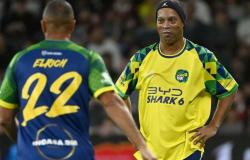Nick Suzuki, the young captain once seen as the future of the Montreal Canadiens, sees his star fading day after day, crushed by the weight of expectations, criticism and his own mistakes…or his nonchalance…
But in the end, he made a monumental blunder that encompasses everything: thinking he was untouchable.
There was a time when the media thought Nick Suzuki was a number one center in the NHL. But today, the signs of a brutal fall are multiplying, and the young captain, rather than shining on the ice, is becoming the target of an unprecedented media storm.
It all started with this trip to the Dominican Republic. While his teammates were competing at the world championships or preparing to face the new season, Suzuki chose to take his partner, Caitlin Fitzgerald, to a luxury hotel, where nights cost between $3,500 and $4,000.
This escapade, revealed by Michel Bergeron, was the spark that ignited Quebec. As soon as the news became known, Bergeron did not hesitate to castigate the captain, claiming that a true leader would never have taken such an extravagant vacation in the middle of the off-season.
Worse still, his fiancée did not hesitate to post the exact location of their stay on social networks, causing an outcry and leaving the image of a disconnected Suzuki, more concerned with his comfort than with the expectations of supporters.
Bergeron mocked the stark contrast between Suzuki and the great leaders who preceded him. “Tired of what?” » he roared, reminding everyone of the sacrifices of legends like Maurice Richard and Jean Béliveau, who would never have taken the risk of tarnishing the image of the team with such sloppy luxury.
This escapade marked a turning point: the young captain, instead of embodying humility and discipline, suddenly reflected the image of a detached, carefree player, more attracted by palm trees and luxury suites than by his role. of captain.
And the criticism doesn’t stop there. On the ice, Suzuki struggles to meet expectations. From the start of the season, his lackadaisical play was singled out by several analysts.
More and more Journa did not hesitate to highlight Suzuki’s lack of commitment in the corners of the ice, accusing him of not wanting to “pay the price” to recover the puck.
With one series of poor performances, he led his team to four victories…in 13 games…leaving fans disappointed and angry with his leadership.
Alongside Cole Caufield and Juraj Slafkovsky, Suzuki seems to be playing on autopilot, unable to generate any spark or compete with opposing top lines.
And as Lemay summed up so well, Suzuki above all seems to need perfect conditions to excel, while great captains know how to raise their game regardless of the circumstances.
In addition to its sporting difficulties, Suzuki faces cultural pressure which continues to grow. His inability to speak French, despite spending five years in Quebec, is a hot topic of controversy.
Brendan Kelly, English-speaking journalist and author of the book The CH and its peoplepublicly criticized Suzuki’s lack of effort in learning the language of Molière.
Even the mayor of Montreal, Valérie Plante, recalled the importance of celebrating and protecting French, a message seen by many as additional pressure on the captain.
However, Suzuki remains unmoved, dodging interviews in French and refusing to make the minimal effort that could have allowed him to get closer to the supporters.
This disconnect is all the more striking when you consider that legends like Bob Gainey and Ken Dryden, both English speakers, made the effort to learn French to honor the local culture.
As for Suzuki, his obstinacy in remaining unilingual gives the image of a disconnected captain, indifferent to Quebec expectations and sensitivities.
Furthermore, Suzuki recently landed a lucrative partnership contract with Tim Hortons, a symbol of Canadian…English-speaking culture.
However, in Quebec, this association provoked bitter laughter. How can this player, unable to connect with fans in their language, claim to be the ambassador of such an iconic brand in Canada?
The advertisements, in which Suzuki attempts to speak in a few words of French, are perceived as an artificial, even insulting, gesture for supporters who expect much more from him than a facade effort.
Suzuki should be the undisputed leader of the Canadian. But instead, he has one disappointing performance after another, content to accumulate his personal statistics without ever taking his team on his shoulders.
Martin St-Louis is finding it increasingly difficult to hide his frustration in the face of his captain’s gloomy performances.
St-Louis no longer hesitates to point out the lack of combativeness of its first trio. Suzuki needs to do more. Even St. Louis’ adjustments, like moving Josh Anderson to the top line, are a desperate attempt to make up for Suzuki’s lack of impact, proof that even within the team, his ability to inspire his teammates is doubted.
Nick Suzuki, once seen as the Canadian’s player of the future, now finds himself at the center of media turmoil and growing disappointment.
Between his ill-advised personal choices, his lack of commitment on the ice, and his cultural disconnect, the young captain seems caught in a downward spiral that only amplifies doubts about his ability to embody the leadership that fans expect.
Its star, once bright, now seems tarnished by its own missteps and the demands of a market as ruthless as Montreal’s.
At this point, the patience of fans and analysts is running out. Suzuki will have to get its act together quickly if it wants to restore its image and prove that it is worthy of wearing the “C”.
But each day that passes without reaction from him reinforces the impression that he may have arrived too early, too quickly, to a position that exceeds his abilities.
Worst captain in the NHL? To ask the question is to answer it.





